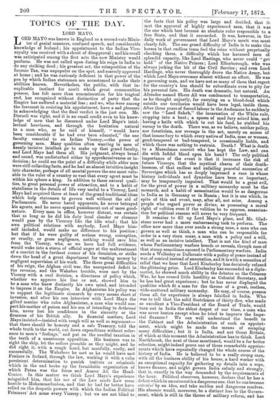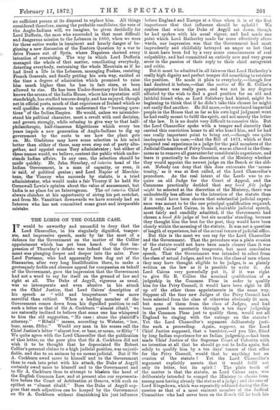TOPICS OF THE DAY
LORD MAYO.
the facts that his policy was large and decided, that it. met the approval of highly experienced men, that it was the one which best became an absolute ruler responsible to a free State, and that it succeeded. It was, however, in the daily work of government that Lord Mayo's merit was most clearly felt. The one grand difficulty of India is to make the horses in that endless team feel the reins without perpetually checking them, a difficulty which has harassed men of splendid capacity, like Lord Hastings, who never could " get hold " of the Native Princes ; Lord Ellenborough, who was always jerking the hit of the Civil Service ; and even Lord Hardinge, who never thoroughly drove the Native Army, but• which Lord Mayo overcame almost without an effort. He was a governing man, and we have not so many of them that regret for the country's loss should be subordinate even to pity for his personal fate. His death was dramatic, but natural. An Afreedee named Shere All was condemned to transportation, as he thought unjustly, for carrying on a blood-feud which outside our territories would have been legal, inside them. After three years of forced labour in the Andamans he suddenly saw the " Lord Saheb," • the incarnation of the White rule, stepping into a boat ; a spasm of mad fury seized him, and having a knife with which to cut his food, he stabbed his enemy to the death. There was, as we believe, neither policy, nor fanaticism, nor revenge in the act, merely an access of that insane fury to which every native of India, man or woman, good-tempered or bad-tempered, is occasionally liable, and which there was nothing to restrain. Death ? What is death, to a Mussulman convict who has kept the Law, and can die with Infidel blood upon his hand ? The only political importance of the event is that it increases the risk of future Viceroys, that the mystical charm of their death-- lessness, of that endless and unfailing peaceful succession of Sovereigns which has so deeply `impressed a race in whose history individuals and dynasties have been so important, may be temporarily impaired. That would be a great evil, for the pivot of power in a military monarchy must be the monarch, and a habit of assassination would be as dangerous in India as in Germany or in Russia ; but it is one which, in spite of this sad event, may, after all, not arise. Among a people who regard power as divine, as possessing a moral right of volition even if the volition be to oppress, assassina,- tion for political reasons will never be very frequent.
It remains to fill up Lord Mayo's place, and Mr. Glad- stone never had a more embarrassing task to perform. The office now more than ever needs a strong man, a man who can govern as well as think, a man who can be responsible for order in a very stern sense, a man with a policy and a will, as well as an incisive intellect. That is not the kind of man whom Parliamentary warfare breeds or reveals, though men of that stamp sometimes succeed in Parliamentary warfare. India needs a Wellesley or Dalhousie with a policy of peace instead of war, of control instead of annexation, and it is with a sensation 01 relief that we hear that Lord Kimberley has decisively refused the glittering prize. Lord Kimberley has succeeded as a diplo- matist, he showed much ability in the debates on the Crimean War, he has roused little hostility as Colonial Secretary, and he has had great experience ; but he has never displayed the qualities which fit a man for the throne of a great, restless, wide-scattered military monarchy. He may, of course, possess them all, for experience is always falsified in India. Who was to tell that the solid Scotchman of thirty-five, who made so excellent a Vice-President of the Board of Trade, would turn out in India the ablest despot of our time, a man who was never beaten except when he tried to improve the Impe- rial finances ? We can well understand the benefit to the Cabinet and the Administration of such an appoint- ment, which might be made the means of escaping many difficulties ; but it is India, and not Great Britain, of which at this moment the Administration has to think. Lord Northbrook, the next of those mentioned, would be a far better selection, might indeed prove one of those remarkable appoint- ments which have repeatedly changed the whole course of the history of India. He is believed to be a really strong man, with all the business ability of his house, a hard worker with an exceptional capacity for gathering up details into a rope, knows finance, and might govern India calmly and strongly, - that is, exactly in the way demanded by the requirements of the hour. Political observers, however, declare that he has a defect which in an autocrat is a dangerous one, that he can become entrains by an idea, and take sudden and dangerous resolves. His absence would, moreover, be a distinct loss to the Govern- ment, which is still in the throes of military reform, and has
no sufficient person at its disposal to replace him. All things considered therefore, among the probable candidates, the vote of the Anglo-Indians will, we imagine, be given decidedly for Lord Dufferin, the man who succeeded in that most difficult and dangerous mission to the Lebanon in 1860, when we were for three entire weeks in imminent and hourly danger of be- ginning a new discussion of the Eastern Question by a war to drive France out of Syria, where Napoleon showed every intention of remaining. The way in which Lord Dufferin managed the whole of that matter, conciliating everybody, detecting everybody, restraining the whole Mountain as if he had lived a life in the Lebanon, managing Pashas, resisting French Generals, and finally getting his own way, excited at the time a degree of admiration which promised to raise him much higher than he has in fact risen, or been allowed to rise. He has been Under-Secretary for India, and knows the arcana of the India House, where his reputation still stands high, has studied tenures deeply, and has enjoyed, though not in official posts, much of that experience of Ireland which so well qualifies a statesman to understand the " burning ques- tions ' of the Indian Empire. He would, unless we misunder- stand his political character, meet a revolt with cool decision, and govern strongly, while refusing to give way to that half- philanthropic, half-timorous fidgettiness which every ten years impels a new generation of Anglo-Indians to dig up government by the roots to see how the plant gets on. Mr. Gladstone may have some selection in his mind better than either of these, may even step out of party alto- gether, and appoint some Tory administrator ; but either of these names would, we believe, content the public which under- stands Indian affairs. In any case, the selection should be made quickly. Mr, John. Strachey, ad interim head of the Indian Government, is a man of capacity, or even, it is said, of political genius ; and Lord Napier of Merchis- tofan, the Viceroy who succeeds by statute, is a tried administrator, Who would make a fair Viceroy if he held Sir Cornewall Lewis's opinion about the value of amusement, but India is no place for an Interregnum. The ad interim Chief always clutches at his opportunity of airing his pet crotchet, and from Mr. Vansittart downwards we have scarcely had an Inter= who has not. committed some great and irreparable mistake.



































 Previous page
Previous page